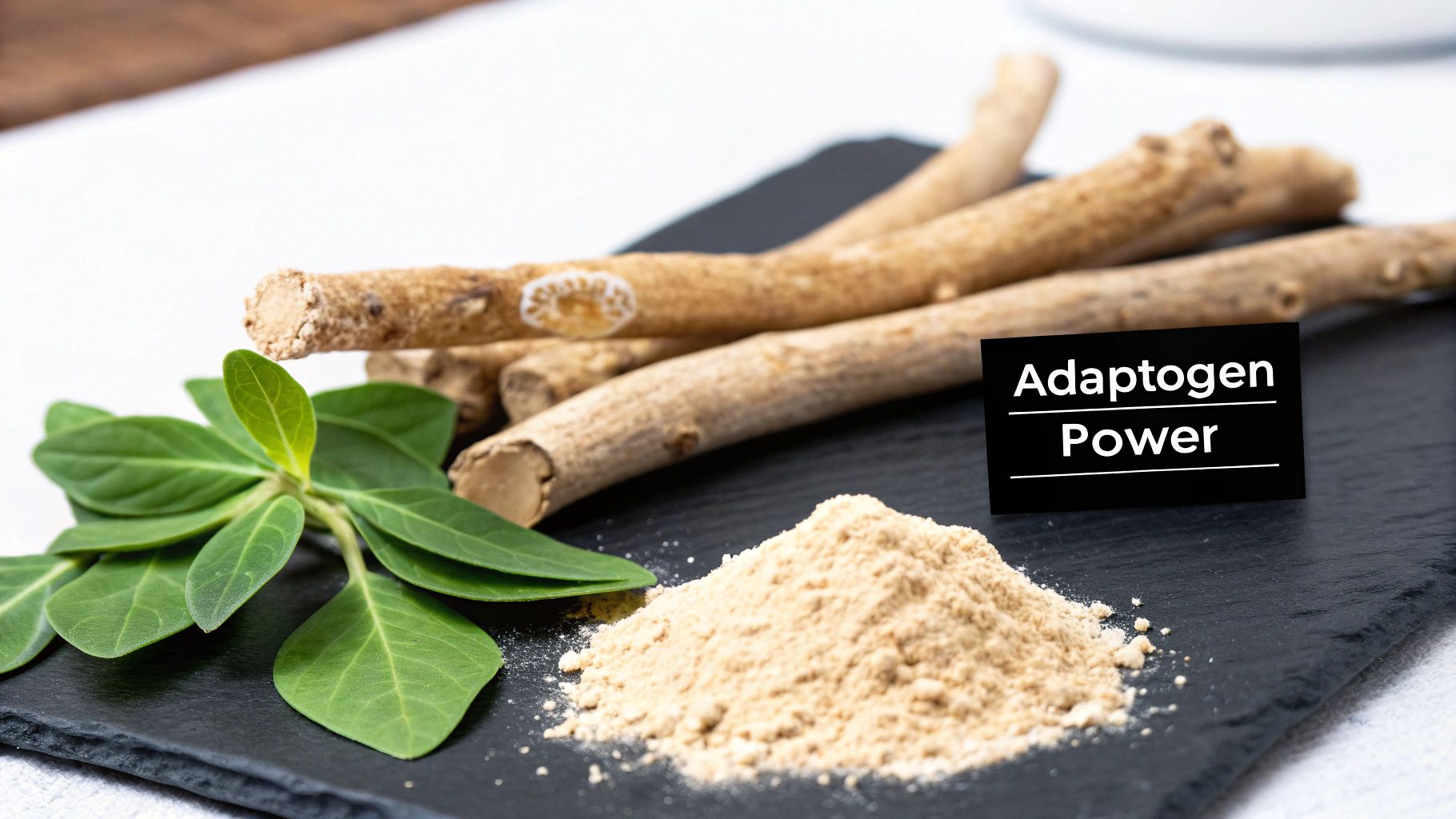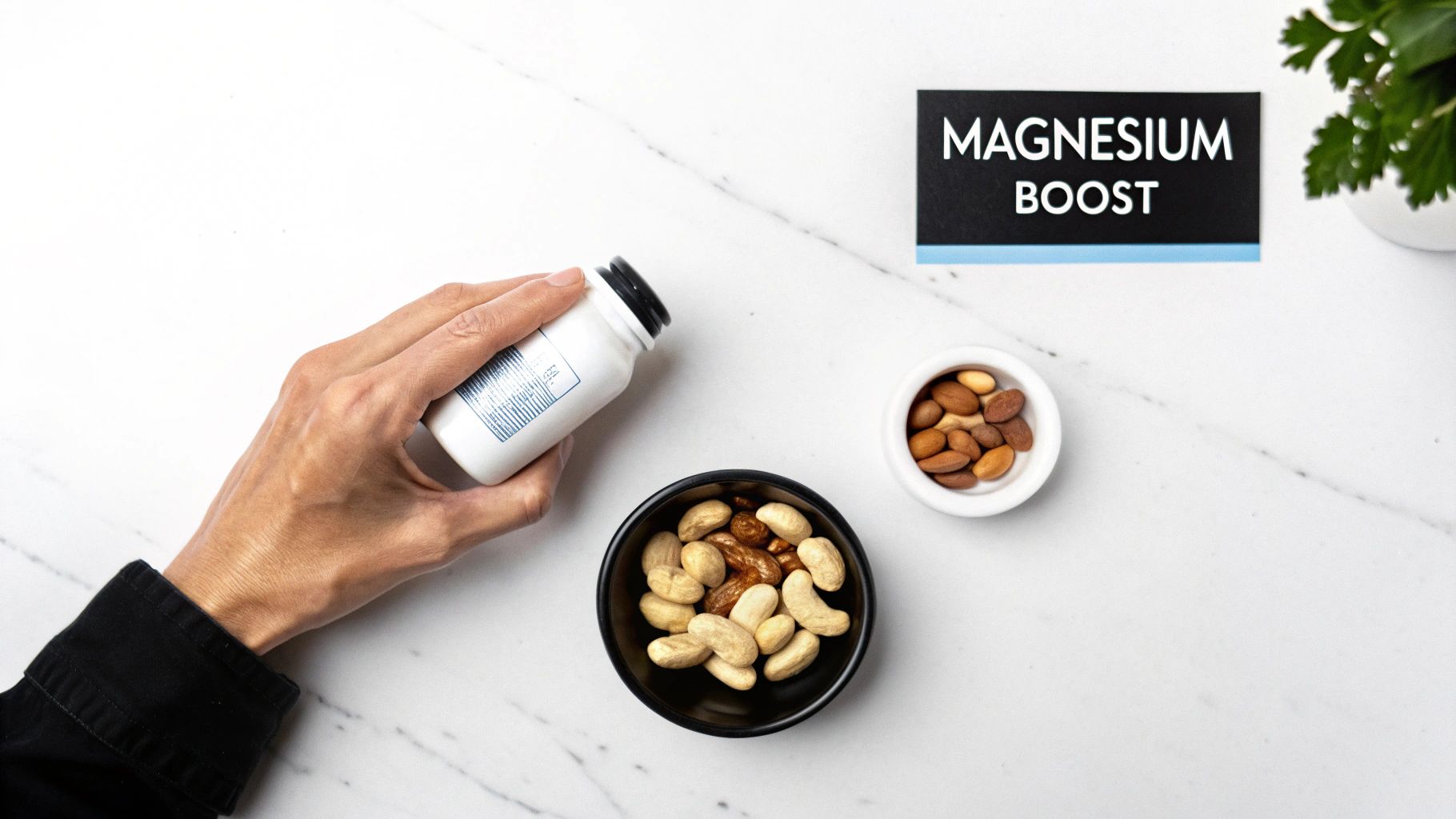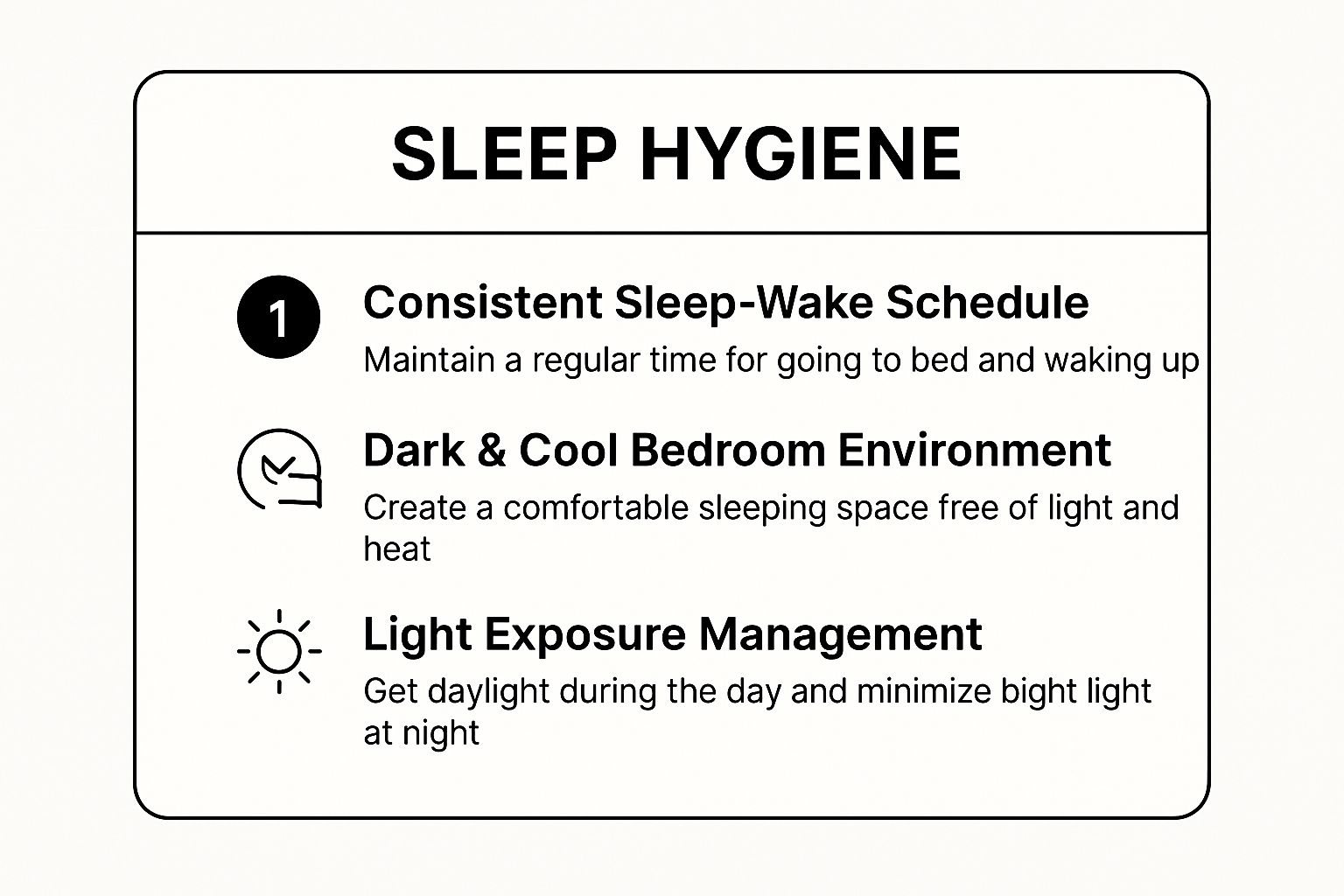Persistent fatigue can feel like an anchor, dragging down your productivity, mood, and overall quality of life. While reaching for another cup of coffee might seem like a quick fix, it often just masks the underlying issues, failing to address the core problem. True, lasting energy comes from addressing the root causes of exhaustion, which often involves a holistic look at the body's interconnected systems.
This comprehensive guide moves beyond generic advice to provide actionable strategies, exploring powerful and evidence-backed natural remedies for fatigue. From ancient adaptogenic herbs that help your body manage stress to essential micronutrients that power your cells, we will detail how these remedies work and how to implement them effectively. Addressing underlying imbalances is key, as issues like digestive discomfort can sap energy. For instance, exploring natural remedies for bloating can contribute to overall comfort and well-being, which in turn supports vitality.
Prepare to reclaim your energy and build a sustainable foundation for lasting wellness. This list is designed to help you move beyond temporary boosts and cultivate the resilience needed to thrive, not just survive, each day.
1. Ashwagandha (Withania somnifera)
Ashwagandha (Withania somnifera) is a cornerstone of Ayurvedic medicine, revered for centuries as a powerful adaptogenic herb. As an adaptogen, it enhances the body's resilience to physical and mental stress, making it a formidable natural remedy for fatigue rooted in chronic stress. It works by modulating the hypothalamic-pituitary-adrenal (HPA) axis, the body's central stress response system.
By regulating cortisol levels, the primary stress hormone, ashwagandha helps prevent the adrenal exhaustion that often leads to persistent tiredness. This botanical also supports mitochondrial function, improving energy production at a cellular level and boosting overall vitality.

Why It Works for Fatigue
Ashwagandha’s efficacy is backed by modern research. A 2019 study highlighted its impact, showing that adults taking 300 mg twice daily experienced a significant reduction in fatigue scores. Its ability to combat fatigue extends to physical performance, with athletes reporting notable improvements in endurance. For those dealing with chronic stress and adrenal fatigue, this herb offers a direct path to restoring energy. To learn more about how to support adrenal glands, consider exploring additional resources on the topic.
How to Use Ashwagandha
- Dosage: Take 300-500 mg of a standardized root extract (with at least 5% withanolides) once or twice daily.
- Timing: Consume with meals to enhance absorption and minimize the potential for stomach upset.
- Consistency: Use consistently for at least 4-6 weeks to evaluate its full effects on your energy levels.
- Quality: Choose well-researched, high-quality extracts like KSM-66 or Sensoril to ensure potency and safety.
2. Vitamin B12 (Cobalamin) Supplementation
Vitamin B12, or cobalamin, is a crucial nutrient for energy metabolism, essential for converting food into usable cellular fuel. It plays a fundamental role in red blood cell formation, neurological function, and DNA synthesis. A deficiency in this vitamin is a leading nutritional cause of persistent, unexplained tiredness, as it directly impairs the body's ability to produce energy efficiently within the mitochondria.
This makes B12 one of the most direct and effective natural remedies for fatigue, especially for at-risk populations. Vegetarians, vegans, older adults, and individuals with digestive conditions that hinder nutrient absorption are particularly susceptible to B12 deficiency and its energy-draining effects.
Why It Works for Fatigue
Vitamin B12’s role in fatigue reduction is well-documented. By supporting healthy red blood cell production, it ensures optimal oxygen transport throughout the body, which is vital for sustained energy. Research shows that correcting even a subclinical deficiency can lead to significant improvements; one study found elderly patients had a 60% reduction in fatigue after three months of supplementation. For those with pernicious anemia, regular B12 injections can completely eliminate fatigue.
How to Use Vitamin B12
- Dosage: First, get your blood levels tested to confirm a deficiency. A typical daily dose is 1,000 mcg, but your provider may recommend a different amount.
- Form: Choose methylcobalamin or adenosylcobalamin, which are active forms with higher bioavailability compared to cyanocobalamin.
- Administration: Use sublingual (under-the-tongue) tablets or sprays to improve absorption, bypassing potential digestive issues.
- Balance: Consider a B-complex supplement to ensure a balanced intake of all B vitamins, as they work together synergistically.
3. Rhodiola Rosea (Golden Root)
Rhodiola (Rhodiola rosea), also known as golden root, is a powerful adaptogenic herb native to the cold, mountainous regions of Europe and Asia. Historically used to enhance physical and mental performance, rhodiola is one of the most effective natural remedies for fatigue, particularly when exhaustion is linked to stress. It works by influencing key neurotransmitters like serotonin and dopamine, improving mood and focus while also supporting cellular energy production.
This botanical excels at combating mental fatigue by enhancing cognitive function and reducing the burnout associated with high-stress environments. By optimizing the body's stress response system, rhodiola helps increase stamina and fight the profound tiredness that can result from sustained mental or physical effort.

Why It Works for Fatigue
Rhodiola's fatigue-fighting properties are well-documented. For centuries, it was used by Russian cosmonauts and athletes to maintain peak performance under extreme conditions. Modern studies support its efficacy, with one trial showing that night-shift workers experienced a 20% improvement in mental fatigue scores after taking rhodiola. It is particularly beneficial for individuals in demanding roles, as medical residents reported better focus and reduced exhaustion during strenuous rotations.
How to Use Rhodiola
- Dosage: Take 200-400 mg of a standardized extract (containing 3% rosavins and 1% salidroside) daily.
- Timing: Consume on an empty stomach 30 minutes before a meal, preferably in the morning to avoid potential sleep interference.
- Consistency: Cycle your usage for sustained effectiveness, such as taking it for five days followed by a two-day break.
- Quality: Look for reputable products that use well-researched extracts like SHR-5 to ensure potency and clinical backing.
4. Iron Supplementation (for Iron-Deficiency)
Iron is a vital mineral essential for producing hemoglobin, the protein in red blood cells that transports oxygen from the lungs to the rest of the body. An iron deficiency, a widespread nutritional issue, directly impairs this oxygen delivery system, leading to profound fatigue, weakness, and diminished physical capacity. It is a primary cause of persistent tiredness, especially among menstruating or pregnant women and athletes.
Even a subclinical deficiency, where anemia is not yet present but iron stores (ferritin) are low, can be a major hidden source of fatigue. Restoring iron levels allows the body to produce sufficient hemoglobin, ensuring cells receive the oxygen they need for energy metabolism and combating the deep-seated exhaustion that characterizes iron deficiency.
Why It Works for Fatigue
Iron’s role in energy production is direct and well-documented. When you are deficient, your body cannot create enough healthy red blood cells, resulting in less oxygen for your muscles and brain. Research shows that correcting this deficiency has a significant impact; for instance, female athletes with low ferritin often report dramatic improvements in both energy and performance after supplementation. Similarly, postpartum women frequently find that iron therapy alleviates the chronic fatigue that follows childbirth and blood loss.
How to Use Iron Supplements
- Testing: Always get your ferritin levels tested by a healthcare provider before supplementing. Don't supplement blindly, as excess iron can be toxic.
- Dosage: Your practitioner will recommend a dose based on your lab results. A common goal is to raise ferritin levels to an optimal range of 50-100 ng/mL.
- Absorption: Take iron with a source of vitamin C (like orange juice) to boost absorption. Avoid taking it with calcium, coffee, or tea, as they can interfere with uptake.
- Form: Consider highly absorbable and gentle forms like ferrous bisglycinate, often recommended by brands like Thorne Research, to minimize gastrointestinal side effects.
- Monitoring: Retest your iron and ferritin levels after three months of consistent use to track progress and adjust your dosage as needed.
5. Coenzyme Q10 (CoQ10/Ubiquinone)
Coenzyme Q10 (CoQ10), or ubiquinone, is a vitamin-like compound found in every cell of your body, concentrated in the mitochondria. It is essential for producing adenosine triphosphate (ATP), which is the primary source of cellular energy. Think of CoQ10 as the spark plug that ignites the engine within your cells to generate power.
Levels of CoQ10 naturally decline with age and can be depleted by certain medications, like statins, contributing directly to fatigue. As one of the most effective natural remedies for fatigue, supplementing with CoQ10 helps replenish these stores, reigniting cellular energy production and boosting overall vitality. It also acts as a potent antioxidant, protecting mitochondria from damage.
Why It Works for Fatigue
CoQ10's role in energy metabolism is well-documented. Research shows significant benefits for fatigue-related conditions. For example, a study involving fibromyalgia patients found that 300 mg of CoQ10 daily led to a 47% reduction in fatigue symptoms. Similarly, individuals taking statins often find that CoQ10 supplementation alleviates the muscle fatigue and weakness associated with the medication, directly improving their energy levels and quality of life.
How to Use CoQ10
- Dosage: Take 100-300 mg daily. For those with significant deficiency or taking statins, higher doses may be beneficial.
- Timing: Consume with a fat-containing meal to maximize absorption, as CoQ10 is fat-soluble. Divided doses (morning and afternoon) can maintain steadier levels.
- Formulation: Choose an oil-based softgel for better bioavailability. For individuals over 40, the ubiquinol form is often recommended as it is more easily absorbed.
- Consistency: Be patient. It can take 8-12 weeks to experience the full energizing effects as cellular levels gradually build up.
6. Magnesium Supplementation
Magnesium is a vital mineral that participates in over 300 biochemical reactions in the body, playing a central role in energy metabolism. It is indispensable for the creation and utilization of adenosine triphosphate (ATP), the body's primary energy currency. This function makes it one of the most effective natural remedies for fatigue, as it directly supports the conversion of food into cellular energy.
Unfortunately, magnesium deficiency is widespread due to factors like depleted soil nutrients, chronic stress, and modern dietary habits. Even a mild insufficiency can manifest as significant fatigue, muscle weakness, and poor sleep, creating a cycle of exhaustion. Restoring magnesium levels can directly address these symptoms by enhancing energy production and supporting nerve and muscle function.

Why It Works for Fatigue
Magnesium's role in combating fatigue is multifaceted. It not only fuels ATP production but also helps regulate neurotransmitters that promote calm and restful sleep, which is critical for daytime energy. Individuals with chronic fatigue and fibromyalgia often report substantial improvements after correcting a deficiency. For instance, athletes often use magnesium glycinate to eliminate persistent fatigue and improve recovery times, demonstrating its direct impact on both physical and mental energy.
How to Use Magnesium
- Dosage: Aim for 300-400 mg of elemental magnesium daily.
- Form: Choose highly absorbable forms like glycinate, malate, or threonate. Avoid magnesium oxide due to poor bioavailability.
- Timing: Take with food to prevent digestive upset. Consider splitting the dose between morning and evening for sustained benefits.
- Specifics: Use magnesium glycinate before bed to improve sleep quality or magnesium malate during the day to target muscle fatigue and boost energy.
7. Ginseng (Panax Ginseng/Asian Ginseng)
Panax ginseng, also known as Asian or Korean ginseng, is a highly esteemed herb in traditional Chinese medicine celebrated for its ability to combat fatigue and enhance physical vitality. It functions as an adaptogen, helping the body resist various stressors. Its primary active compounds, ginsenosides, are responsible for its energizing effects.
Ginseng works by improving cellular metabolism, which boosts energy production at a fundamental level. It also reduces oxidative stress and supports immune function, both of which are crucial for maintaining sustained energy. This powerful root is particularly effective for addressing physical fatigue and improving overall exercise performance.
Why It Works for Fatigue
Ginseng’s role as one of the key natural remedies for fatigue is well-documented. Research, including studies from institutions like Memorial Sloan Kettering Cancer Center, has shown its effectiveness in reducing cancer-related fatigue. For instance, cancer patients taking 2000 mg daily reported significant improvements. It also enhances physical performance in elderly individuals and helps athletes improve endurance and recover faster from exercise-induced fatigue. Due to its impact on vitality, some also consider it among other herbs that may support male health.
How to Use Ginseng
- Dosage: A typical dose is 200-400 mg of a standardized extract daily.
- Timing: Take in the morning or early afternoon to avoid any potential impact on sleep. For best absorption, consume on an empty stomach.
- Consistency: Consider cycling its use, such as 4-6 weeks on followed by a 2-week break, to maintain its effectiveness.
- Quality: Look for standardized extracts containing 4-7% ginsenosides. Korean red ginseng is often considered the most potent form.
8. Quality Sleep Hygiene Practices
Sleep hygiene refers to the collection of habits and practices that are crucial for consistent, high-quality sleep. As poor sleep is one of the most direct causes of daytime fatigue, establishing strong sleep hygiene is a foundational natural remedy. This approach works by aligning your body's internal clock (circadian rhythm) with daily routines, allowing for optimal physiological restoration and repair during the night.
By creating a conducive environment and consistent schedule, you signal to your body when it's time to wind down and when to be alert. This regulation of the sleep-wake cycle directly addresses fatigue at its source, leading to enhanced energy, cognitive function, and overall well-being. Neuroscientists like Dr. Andrew Huberman have popularized protocols that optimize this process.
Why It Works for Fatigue
The link between poor sleep and fatigue is undeniable. Quality sleep allows the brain to clear metabolic waste and consolidate memories, while the body repairs tissues and regulates hormones. Without it, you accumulate a "sleep debt" that manifests as persistent tiredness. A significant component of natural energy restoration involves quality sleep, and exploring how blue light glasses can improve rest and sleep quality offers a modern solution to screen-related sleep disruption. For a deeper understanding of sustainable energy enhancement, you can explore more strategies for boosting energy naturally.
How to Practice Good Sleep Hygiene
- Consistency: Go to bed and wake up at the same time every day, even on weekends, to regulate your body's clock.
- Environment: Keep your bedroom cool (around 65°F / 18°C), dark (use blackout curtains), and quiet.
- Light Exposure: Avoid screens 1-2 hours before bed. Get bright sunlight exposure within 30 minutes of waking.
- Routine: Create a relaxing pre-sleep ritual, such as reading, gentle stretching, or meditation, to signal to your body that it's time to sleep.
- Diet: Avoid caffeine after 2 PM and steer clear of large meals or alcohol close to bedtime.
10. Prioritizing Sleep Hygiene
Quality sleep is the foundation of energy, yet it is often the first thing sacrificed in a busy lifestyle. Sleep hygiene refers to the set of habits and practices that are conducive to sleeping well on a regular basis. Establishing a strong sleep routine is one of the most powerful natural remedies for fatigue, as it allows your body and brain to fully repair, recharge, and consolidate memories, ensuring you wake up feeling restored.
Poor sleep hygiene disrupts the body’s natural circadian rhythm, leading to shallow or fragmented sleep that fails to replenish your energy reserves. By optimizing your sleep environment and daily routines, you directly support the physiological processes that combat daytime grogginess and mental fog. This foundational approach addresses the root cause of much preventable fatigue.
The infographic below summarizes the core pillars of effective sleep hygiene for quick reference.

These key takeaways highlight how consistency, environment, and light are crucial for regulating your internal clock.
Why It Works for Fatigue
Consistent, high-quality sleep allows for the complete cycling through sleep stages, particularly deep sleep and REM, which are vital for physical and mental restoration. During these stages, the body repairs tissues, releases growth hormone, and processes information. A 2018 review in the Journal of Clinical Sleep Medicine affirmed that improving sleep hygiene is a primary intervention for reducing fatigue related to insufficient sleep. Consistently applying these practices helps realign your circadian rhythm, making it easier to fall asleep and wake up feeling energized.
How to Improve Sleep Hygiene
- Consistent Schedule: Go to bed and wake up at the same time every day, even on weekends, to regulate your body's internal clock.
- Optimize Your Bedroom: Keep your room dark, quiet, and cool (around 65°F or 18°C). Use blackout curtains, earplugs, or a white noise machine if needed.
- Manage Light Exposure: Get bright light exposure in the morning to signal wakefulness. Avoid blue light from screens for at least one hour before bed, as it suppresses melatonin production.
- Mindful Wind-Down: Create a relaxing pre-sleep ritual, such as reading a book, taking a warm bath, or practicing light stretching.
Natural Remedies for Fatigue: Comparative Overview
| Item | 🔄 Implementation Complexity | ⚡ Resource Requirements | 📊 Expected Outcomes | 💡 Ideal Use Cases | ⭐ Key Advantages |
|---|---|---|---|---|---|
| Ashwagandha (Withania somnifera) | Moderate; requires consistent dosing over weeks | Moderate; standardized extracts recommended | Reduces stress-related fatigue; improves endurance | Chronic stress, adrenal support, physical vitality | Backed by clinical studies; adaptogenic; improves mental clarity |
| Vitamin B12 (Cobalamin) Supplementation | Low; easy oral or injection forms | Low; widely available and inexpensive | Rapid fatigue improvement when deficient | B12 deficiency, vegans, elderly, malabsorption | Fast acting; multiple delivery methods; safe at high doses |
| Rhodiola Rosea (Golden Root) | Low to moderate; fast effects but requires timing control | Moderate; standardized extracts preferred | Quick mental fatigue relief; improves stamina | Stress-induced fatigue, mental exhaustion | Fast acting; enhances mood and cognitive performance |
| Iron Supplementation (for Iron-Deficiency) | Moderate; requires testing and long-term supplementation | Moderate; form-dependent absorption | Dramatic energy improvements when deficient | Iron-deficiency anemia, menstruating women, athletes | Highly effective for fatigue due to deficiency; inexpensive |
| Coenzyme Q10 (CoQ10/Ubiquinone) | Moderate; longer timeframe for results | Higher cost; proper form critical | Improves mitochondrial energy; reduces chronic fatigue | Age-related fatigue, statin users, chronic fatigue | Addresses fundamental energy production; antioxidant benefits |
| Magnesium Supplementation | Low; varies by form and tolerance | Low; widely available and affordable | Enhances energy metabolism; improves sleep quality | Fatigue, muscle weakness, sleep disturbances | Safe; fast benefits; multiple forms for targeted effects |
| Ginseng (Panax Ginseng/Asian Ginseng) | Moderate; requires dosing and cycling | Moderate to high; quality varies widely | Improves physical and mental energy; immune support | Physical fatigue, exercise performance, recovery | Long traditional use; well researched; multi-system benefits |
| Quality Sleep Hygiene Practices | Moderate to high; requires lifestyle changes | Minimal; may require environment modifications | Significantly boosts energy through better sleep | Chronic fatigue from poor sleep, shift workers | Zero cost; no side effects; sustainable and broad benefits |
Crafting Your Personalized Path to Lasting Vitality
Navigating the landscape of persistent tiredness can feel overwhelming, but as we've explored, a wealth of powerful natural remedies for fatigue can help you reclaim your energy. The journey to vitality is not about finding a single, universal cure. Instead, it’s about constructing a personalized and holistic strategy that aligns with your body's unique biochemistry and lifestyle demands.
Key Takeaways for Sustainable Energy
We have detailed several potent avenues for combating fatigue, from leveraging the stress-modulating power of adaptogenic herbs like Ashwagandha and Rhodiola Rosea to addressing critical nutrient deficiencies with Vitamin B12, iron, and magnesium. Each remedy serves a distinct purpose. Adaptogens help your body manage stress more efficiently, preventing the adrenal exhaustion that often leads to burnout. Meanwhile, targeted supplementation replenishes the essential metabolic cofactors, like CoQ10, that fuel cellular energy production.
The most profound and lasting results emerge when these targeted interventions are built upon a solid foundation. This is where mastering fundamental lifestyle practices, particularly sleep hygiene, becomes non-negotiable. No supplement or herb can fully compensate for inadequate rest. Prioritizing a consistent sleep schedule and creating a restorative sleep environment is the cornerstone of any effective anti-fatigue protocol.
Your Actionable Next Steps
The true value of this knowledge lies in its application. Rather than attempting to implement everything at once, which can lead to feeling overwhelmed, select one or two strategies that resonate most with your current situation.
- Start with the Basics: If your sleep habits are inconsistent, focus solely on improving your sleep hygiene for the next two weeks. This foundational step can amplify the effects of any other remedy you introduce later.
- Consider Your Symptoms: Do you feel stressed and wired? An adaptogen like Ashwagandha might be a suitable starting point. Is your fatigue accompanied by pale skin and shortness of breath? It may be wise to get your iron levels checked by a professional.
- Listen to Your Body: As you integrate these natural remedies for fatigue, pay close attention to the feedback your body provides. Keep a simple journal to track your energy levels, sleep quality, and overall mood. This practice allows you to identify what works best for you and make informed adjustments.
Remember, reclaiming your vitality is a dynamic process of listening, adjusting, and consistently supporting your body's innate ability to heal and generate energy. If persistent fatigue continues despite your best efforts, it is crucial to recognize it as a potential signal of a deeper imbalance that requires professional guidance. Consulting a qualified healthcare provider can help uncover the root cause and develop a more comprehensive treatment plan. By taking these deliberate, informed steps, you are not just fighting fatigue; you are actively building a more resilient, vibrant, and energized version of yourself.
Ready to address the root cause of your fatigue with a personalized, expert-led approach? At Eric Tsai Acupuncture and Herbs, we specialize in creating integrative treatment plans that combine traditional wisdom with modern insights to restore your body's natural balance and vitality. Schedule your consultation today at Eric Tsai Acupuncture and Herbs and take the definitive step toward lasting energy.

